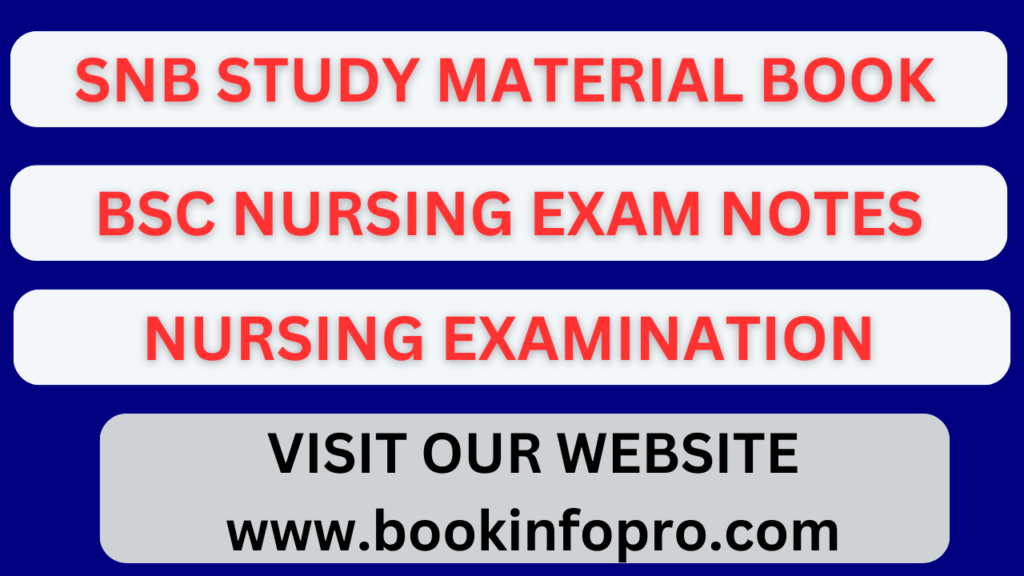Singapore Nursing Board (SNB) Exam Practice and Model Questions and Answers
SNB EXAMINATION PRACTICE BOOK VOLUME 1 AND 2 COMBINED AVAILABLE CLICK HERE
Which communication technique encourages the patient to share more information?
a) Closed-ended questions
b) Probing questions
c) Clarifying questions
d) Reflective questions
Answer: b) Probing questions
When delivering bad news to a patient, which communication skill is crucial?
a) Avoiding the topic until later
b) Being overly blunt and direct
c) Using empathy and sensitivity
d) Offering no emotional support
Answer: c) Using empathy and sensitivity
In holistic nursing, what does the acronym “CAM” stand for?
Comprehensive And Multidisciplinary
Complementary And Medical
Complementary And Alternative Medicine
Continuous Assessment Model
Answer: c) Complementary And Alternative Medicine
What is an essential aspect of providing holistic end-of-life care?
Focusing solely on pain management
Including family members in care decisions
Avoiding discussions about death and dying
Withholding emotional support to prevent attachment
Answer: b) Including family members in care decisions
When providing client education, the nurse should use plain language and avoid medical jargon to ensure:
The client feels comfortable asking questions
The nurse appears more knowledgeable
The client is less likely to comply with instructions
The client becomes more reliant on medical professionals
Answer: a) The client feels comfortable asking questions
A client with hypertension asks the nurse about reducing salt intake. What dietary recommendation should the nurse provide?
Avoid all sources of salt completely
Use salt substitutes
Limit salt intake to less than 2300 mg per day
Consume at least 10 grams of salt daily
Answer: c) Limit salt intake to less than 2300 mg per day
Which intervention is essential for preventing patient falls in a hospital setting?
a) Encourage patients to get out of bed frequently
b) Provide non-slip footwear to all patients
c) Perform regular safety assessments and implement appropriate measures
d) Keep patients sedated to prevent mobility
Answer: c) Perform regular safety assessments and implement appropriate measures
What is the purpose of the “time-out” procedure before a surgical procedure?
a) To rush through the surgery to save time
b) To ensure all surgical instruments are available
c) To pause and confirm patient identity, procedure, and site
d) To reduce the surgical team’s workload
Answer: c) To pause and confirm patient identity, procedure, and site
A patient has been diagnosed with diabetes and is learning to self-administer insulin injections. During education, the patient repeatedly asks questions about the process. What is the nurse’s best response?
Provide a detailed explanation once, and assume the patient will remember
the information.
Give the patient a pamphlet to read and encourage them to ask any remaining questions later.
Demonstrate the insulin injection process and then have the patient perform a return demonstration.
Tell the patient not to worry and that the nursing staff will always be available to administer injections.
Answer: C) Demonstrate the insulin injection process and then have the patient perform a return demonstration.
What is the most effective way to prevent falls in a healthcare setting?
Keeping the patient’s room dimly lit
Encouraging the use of personal belongings near the bedside
Implementing regular safety rounds
Reducing the use of handrails in hallways
Answer -Implementing regular safety rounds
What is the recommended angle for administering an intradermal injection?
45 degrees
90 degrees
15 degrees
30 degrees
Answer: c) 15 degrees
Which of the following is not a type of IV fluid?
Normal Saline (0.9% NaCl)
Dextrose 5%
Hydrochloric Acid Solution
Lactated Ringer’s
Answer: c) Hydrochloric Acid Solution
Which type of IV fluid is commonly used to expand blood volume and treat dehydration?
Dextrose 5%
Hypertonic Saline
Normal Saline (0.9% NaCl)
Potassium Chloride
Answer: c) Normal Saline (0.9% NaCl)
SNB EXAMINATION PRACTICE BOOK VOLUME 1 AND 2 COMBINED AVAILABLE CLICK HERE

